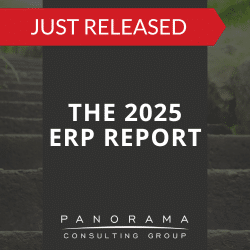Artificial intelligence (AI) is reshaping the operational and scientific landscape of the pharmaceutical industry. As AI technology transforms drug discovery, development, and delivery, it’s also enabling operational efficiencies.
Today, we’re sharing insights into how AI is optimizing various pharmaceutical processes, from research and development (R&D) to supply chain management.
The Use of AI in the Pharmaceutical Industry: 4 Benefits for R&D
1. Bridging the Gap Between Data and Discovery
During drug discovery and development, a vast amount of data is generated that includes everything from genetic information to patient records.
Artificial intelligence, with its machine learning (ML) and deep learning capabilities, can sift through this data, identifying patterns and providing actionable insights. This not only accelerates the pace of discovery but it enhances drug targeting and efficacy.
The 2025 ERP Report
72.6% of respondents said they've already deployed AI at their organizations. Learn about AI adoption and other ERP trends by downloading our latest report.
2. Enhancing Drug Design and Development
Traditional methods of drug discovery are time-consuming and costly, with a high rate of failure.
Life science companies can use AI algorithms to predict the structure of new drug molecules, understand how they will interact with biological targets, and estimate their effects in the body. This predictive modeling reduces the need for extensive laboratory experiments and clinical trials.
For example, Google’s DeepMind developed AlphaFold 2, an AI system that predicts the 3D structures of proteins with remarkable accuracy.
3. Transforming Patient Care with Personalized Medicine
The ultimate goal of pharmaceutical R&D is to improve patient outcomes. AI facilitates this by enabling companies to tailor treatments to individual patient characteristics and genetic profiles.
By analyzing patient data, AI can identify biomarkers for disease, predict individual responses to treatments, and recommend the most effective therapy plans.
4. Expediting Clinical Trials
During this phase, AI can optimize trial design, improve patient recruitment, and enable real-time monitoring of trial data.
Healthcare companies can use AI to identify candidates for specific trials, predict patient response to treatments, and continually adjust trial parameters.
In addition, companies can conduct parallel testing of drugs for different uses. This approach can save time and money, enabling researchers to explore multiple treatment options simultaneously.
The New Frontier: AI-Enabled ERP Systems
ERP systems have long been the backbone of pharmaceutical operations, providing a unified platform for managing finance, supply chain, manufacturing, and research data. Artificial intelligence can enhance these capabilities.
Many of the top ERP systems have powerful AI capabilities, and pharma companies are taking note. In addition to R&D optimization, some of the benefits companies are realizing include:
1. Enhanced Forecasting and Demand Planning
AI algorithms excel in identifying patterns and predicting future trends. In the pharmaceutical industry, this translates into more accurate forecasting and demand planning.
AI-enabled ERP systems can analyze sales data, market trends, and even external factors such as seasonal diseases, to predict demand for various drugs. This precision in forecasting helps companies manage their inventory more effectively, reducing both shortages and overstock situations.
Our ERP selection consultants frequently help manufacturing companies move to cloud-based ERP systems to consolidate their data and enable more accurate forecasting.
In the pharma industry, this means looking for AI-enabled systems that use shop floor data, sales data, and external data to align production schedules with demand.
2. Streamlined Supply Chain Management
The pharmaceutical supply chain is a complex web of raw material suppliers, manufacturers, distributors, and retailers.
AI-powered ERP systems can optimize supply chain management by analyzing data from various sources to predict supply chain disruptions and suggest alternative strategies.
Moreover, intelligent algorithms can optimize routes and schedules for logistics, reducing delivery times and costs.
3. Regulatory Compliance and Quality Control
Artificial intelligence plays a crucial role in ensuring compliance by monitoring and analyzing operations in real-time.
AI can automatically flag deviations from standard procedures, helping pharma companies take corrective action before minor issues escalate into major compliance violations.
Additionally, AI can enhance quality control by analyzing data from manufacturing processes to identify potential quality issues early in the production cycle.
Our independent ERP consultants recently helped a manufacturing firm in the bioscience space implement a cloud-based quality management system. The system helped reduce inspection times and increase quality pass rates.
(Learn more about the role of ERP in the pharmaceutical industry.)
Challenges of Using AI in Pharma
Implementing AI in the pharma industry can be fraught with challenges.
Privacy, data security, and ethical considerations are major concerns, especially given the sensitive nature of health-related data. Establishing transparent data practices requires significant time and resources, and ensuring AI systems are free from bias demands advanced expertise.
In addition, the costs associated with implementation and training can be significant. Employees not only need training on specific AI tools, but they need a broader understanding of AI technologies. Moreover, initial implementation expenses can be substantial, and the ROI is gradual.
Another challenge lies in integrating AI into existing processes without compromising the integrity and reliability of pharmaceutical practices. The industry must navigate the delicate balance between embracing automation and adhering to the regulatory standards governing drug development and patient safety.
With the right strategy and approach, pharma companies can overcome these hurdles. The key is to follow a proven AI implementation process and work with the right enterprise software consultants.
Is AI the Next Step for Your Pharma Company?
While challenges remain, the potential benefits of AI in the pharmaceutical industry are too significant to ignore. AI technologies are accelerating drug discovery, expediting clinical trials, and optimizing operations through ERP integration.
To learn more contact our ERP consultants below.













